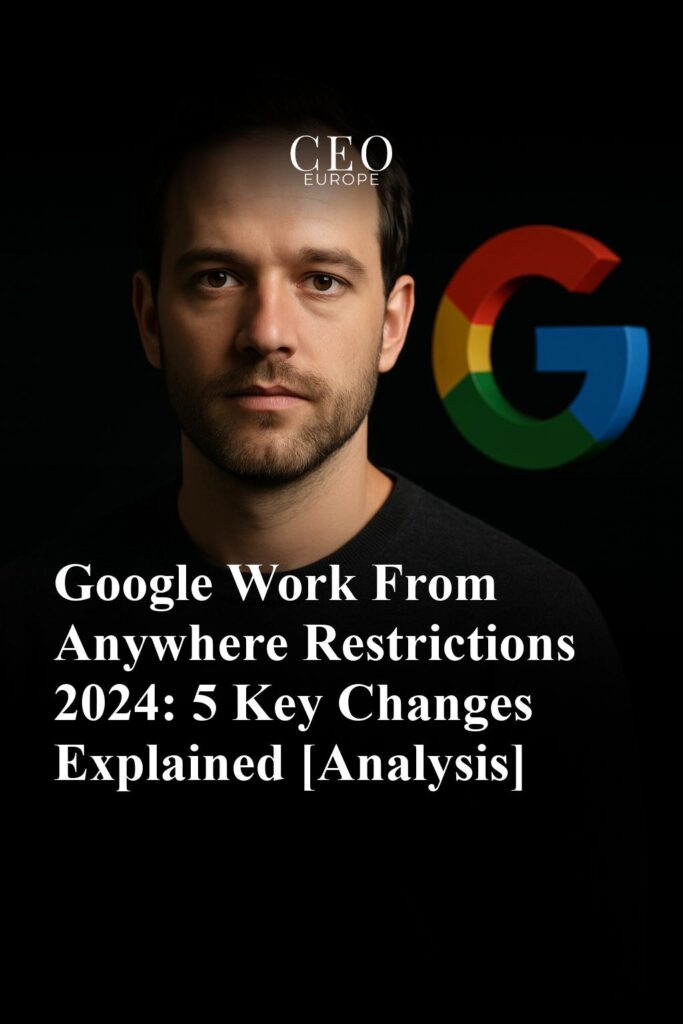1. Introduction
The Google work from anywhere restrictions announced for 2024 mark a significant shift in the company’s remote work policy changes. As Google refines its approach, employees and employers alike must adapt to new limitations on remote work flexibility. These changes come in response to evolving business needs and challenges around sustaining productivity and collaboration in a hybrid environment. By restricting how and where remote work can occur, Google aims to balance employee mobility with organizational coherence. This analysis explores the detailed implications of these updated work from anywhere limitations and their impact on Google’s workforce and broader tech industry trends.
2. Background
Since launching its pioneering Work from Anywhere (WFA) policy in 2021, Google has allowed employees to work remotely from any location for up to four weeks annually. This approach initially embraced maximum flexibility, encouraging significant travel rather than remote days spent at or near home. However, the Google work from anywhere restrictions have evolved under leaders like Sundar Pichai and Sergey Brin to place clearer boundaries on this perk. For instance, employees can no longer claim WFA days to work simply from their residence; the policy now focuses on meaningful travel within a country, reflecting a strategic pivot away from permanent remote or near-home work [1]. This evolution underscores Google’s effort to better define remote work boundaries in an increasingly hybrid work landscape.
3. Trends
The current Google WFA updates reflect emerging trends among major tech companies aiming to temper initial remote work enthusiasm. Unlike earlier widespread permissiveness, many firms are adjusting remote work policy changes to encourage increased in-person interaction, seen as essential for innovation and culture. For example, Google’s move to deduct an entire week of WFA allowance whether a single or multiple days are used highlights a tightening control approach. Other tech giants have similarly introduced work from anywhere limitations by limiting remote work eligibility or imposing stricter office attendance requirements. These trends suggest a recalibration whereby companies recognize the value of office presence while still accommodating remote work’s benefits in a balanced model.
4. Insights
Google’s updated restrictions have direct consequences on employee mobility, necessitating a more strategic use of remote work days. The new policy deducts one full week from the WFA balance regardless of the number of remote days used within that week, incentivizing employees to concentrate their travel [1]. Early feedback and surveys indicate mixed employee sentiment: while some appreciate the ability to travel and work remotely, others express frustration over reduced flexibility and perceived increased managerial oversight. One can liken this to booking flights with strict fare rules: the more you use the allotment, the faster it depletes. This approach stresses planning and prioritization in scheduling remote work to maximize benefits while complying with the guidelines.
5. Forecast
Looking ahead, the Google work from anywhere restrictions may signal a broader industry recalibration of hybrid work models. It is likely other tech firms will monitor Google’s outcomes closely and potentially adopt similar measures to better regulate remote work. The long-term effect could involve a hybrid equilibrium where remote work is embraced but strategically limited to preserve collaboration and organizational culture. For Google specifically, the emphasis on meaningful travel rather than casual remote days could foster more purposeful employee mobility. The challenge will be balancing this while retaining talent attracted by flexibility. Insights from this shift could inform continuous refinements in remote work policy across the tech sector.
6. How-to
Navigating the new Google work from anywhere restrictions requires employees to plan remote work strategically. First, prioritize remote days for significant travel rather than working from a home or nearby location. Given that one WFA week is deducted regardless of days worked remotely in that period, consolidating WFA days to maximize experience is wise. Second, maintain clear communication with managers about plans and how remote work supports productivity. Preparing a rationale rooted in project goals and collaboration needs helps address potential skepticism. Employees can also explore resources on managing hybrid work schedules effectively, such as guides on balancing travel and office time, to optimize compliance. Practical tips like these are essential for thriving under evolving policies like Google’s.
7. FAQ
Q: Can I work remotely from home under the new Google WFA policy?
A: No, the updated restrictions specifically exclude working from home or nearby; WFA weeks apply to travel outside your usual location [1].
Q: How does the week deduction system work?
A: Regardless of using 1 or 5 WFA days in a calendar week, 1 full WFA week is deducted from your balance.
Q: What impact do these changes have on productivity?
A: Initial analysis suggests focused travel-based remote work may improve productivity by encouraging more purposeful remote sessions, though employee adaptation varies.
For more details on broader organizational change strategies that complement remote work adjustments, see our content strategy insights.
8. Conclusion
In summary, the Google work from anywhere restrictions for 2024 introduce targeted refinements to a once highly flexible remote work program. The emphasis shifts toward significant travel over casual remote days, with one WFA week deducted even for minimal remote usage within that week. These changes reflect a growing industry trend to balance the benefits of remote work with the need for in-person collaboration. Employees are encouraged to adapt proactively, planning WFA usage thoughtfully and engaging transparently with management. As the remote work landscape continues to evolve, Google’s experience offers valuable lessons on managing flexibility and productivity.
Sources and references
1. Google Sets New Restrictions on Work from Anywhere Perk | Entrepreneur

